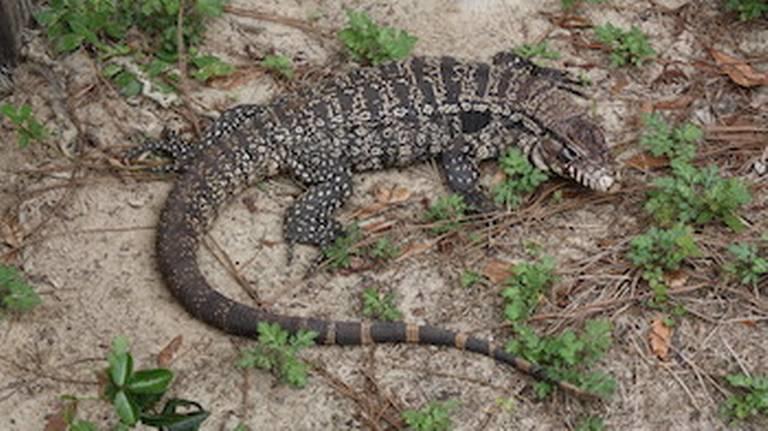
Caption
Georgia DNR is asking everyone in Toombs and Tattnall counties to watch for tegus when outdoors and report any of these non-native lizards they see.
Credit: Stan Kirkland/Florida Fish and Wildlife Conservation

Georgia DNR is asking everyone in Toombs and Tattnall counties to watch for tegus when outdoors and report any of these non-native lizards they see.
Is Georgia about to be invaded by giant Argentine lizards?
Well, that wasn’t on the 2024 bingo card.
Don’t worry, it’s not happening, but we should keep our eyes peeled.
According to the Georgia Department of Natural Resources (Wildlife Resources Division), a wild population of the Argentine Black and White Tegus Lizard has been spotted in two Georgia counties (Toombs and Tattnall) since 2018.
Although they can be mistaken for a normal alligator in Georgia, the lizard is native to Brazil, Uruguay and Argentina, so how did it get here? And what should Georgians do if they see one? Here’s what to know:
The Tegus lizard could be kept as a pet in Georgia until December 2023. Since then, the lizards have been on the state’s wild animal list.
Although the DNR isn’t 100% sure, the wildlife division reported that the lizards in Toombs and Tattnall counties were either “captive animals that escaped or were intentionally released.”
The giant lizards can eat just about anything, including alligator eggs, fruit, insects and even small animals like rodents.
The lizards don’t pose a threat to humans or pets, but they are a bit scary, topping out at about four feet long and 10 pounds.
The DNR says their only concern with the lizards is the bacteria that they carry because they can “spread exotic parasites to native wildlife and cause bacterial contamination of crops.”
The lizards can also be carriers of salmonella.
If you see a Tegus lizard on your Georgia property, the DNR says to:
After confirmation from the DNR, you may be given instructions to trap the animal
Of course, since the lizards are a wild animal not native to Georgia, landowners can kill them on private property in accordance with safety precautions and local ordinances.
This story comes to GPB through a reporting partnership with The Telegraph.